The best small business phone systems are those that are cloud-based. More than just technological marvels that carry voices through the ether, they are also incredibly useful tools that can add a layer of sophistication to any business. Using cloud-based phone systems, you can create the impression of a large, thriving enterprise, you can manage calls and messaging to suit your business and style, and your customers are always given the best possible service. You can use these systems to carry your office on your mobile phone, complete with business texting and professionally recorded voice messages, and you can engage with customers on a deeper level across text, voice and email.
In this guide we have rounded up some of the best small business phone systems on the market today, each one offering something a little different and each one boasting some excellent features and capabilities. We have made life easier for you by adding in which industry they are best suited for, what pricing structure they fit into and their overall pros and cons.

1. 3CX: Best for fast-growing SMBs
Why you can trust Top Ten Reviews
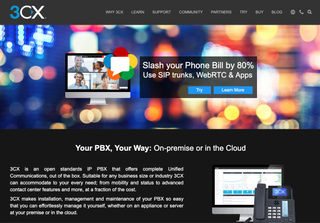
3CX provides the SMB with a small business phone system that will grow with their business. It also offers you various hosting options so you can choose to host with 3CX, keep on using your existing cloud platform, or bring everything on site. This is a nice variable that influences the pricing but not your features. You get plenty of choice when it comes to managing your calls and customers and you get all of them in an easy to use package that has minimal barrier to entry. You can get even the most resistant employee onto the system in fairly short order.
3CX also stands out because of its multiple support options and the fact that it does this support really well. When you’re running your own business, you don’t want to wrestle with broken systems or mysterious issues in connectivity, you need things to work and 3CX goes the extra mile in ensuring that this is exactly what doesn’t happen.
The 3CX platform is versatile, compatible with mobile devices, easy to use, and feature rich with a strong performance. It’s ideally suited to the SMB that wants fast and effective performance with room to grow.
Read our full 3CX review.

2. RingCentral: Best phone system for a medium-sized businesses
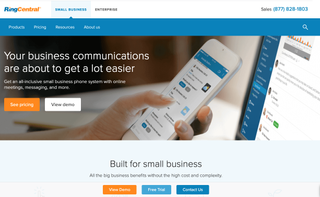
RingCentral has put the small and medium business at the core of its offering but it really is a superb fit for the smaller company that’s moving into bigger spaces. The pricing is slightly higher than some of the other platforms on the market and the features are so diverse that they are suited to a company that has a very clear idea of what it is about.
RingCentral comes with so many features that it’s hard to pick a favorite. Some that stand out include visual voicemail, paging, call delegation, collaborative document editing, mobile applications and call screening. The administrative tools allow for you to really dig deep into what you want the platform to deliver to your business and customers. It gives you the ability to build your brand and structure your systems through an intuitive user interface that won’t leave you breathless with its complexity.
RingCentral offers you a reliable performance wrapped neatly in a bow made up of excellent features and great technology. This system stands out not only for its features but also for its ability to make things like SIP calling and carrier minutes and PBX functionality into easy-to-understand solutions for the business.
Read our full RingCentral review.

3. Vonage Business Cloud: Best for reliability and reputation
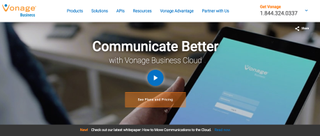
is a really solid small business phone system that won’t let you down – it has been on the market for several years and continues to achieve excellent rankings in reviews. The feature-set you get with Vonage Business Cloud is rich enough to ensure that you can create a dynamic small business environment and provide top notch customer care.
Vonage Business Cloud doesn’t demand extra money spent on hardware; you can get started right this second using nothing more than your desktop and mobile devices. The Vonage MobileConnect app is simple to install and customize and includes features such as call forwarding, follow me, and never miss a call. You can also set call forwarding through the app to ensure that customers can always get a hold of you or are directed to the right person and place.
Vonage Business Cloud is almost completely in the cloud so you can scale up, scale down, customize, adapt and change your features as you need to. This is very useful if you’re a smaller business and you want a platform that will grow with you. The platform is pricier than some of its competitors which may or may not influence your choice – other platforms such as Grasshopper and 3CX are cheaper but they don’t have as varied a feature-set. With Vonage Business Cloud you are getting a good reputation, solid features and a reliable platform for the price.
Read our Vonage Business Cloud review.

4. 8x8 Virtual Office: Best for all types of business size
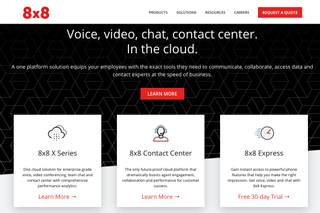
The small business phone stable has been seasoned with a variety of extras so you get to pick a platform and pricing set that suits your business. These may come across as confusing at first, but across the different X series solutions you will find clear breakdowns of features and capabilities that will allow you to match your budget to your potential.
8x8 X2 offers you integration with Google G Suite, Outlook, NetSuite and Salesforce and unlimited calling across 14 countries, while 8x8 X5 gets you unlimited calling across 47 countries and supervisor analytics. The X6 version lands you customer experience analytics and post call survey capabilities that will completely redefine your customer engagements. You can use 8x8 if your business is just starting out, or you can use 8x8 if you are a larger enterprise looking for some juice. Either way, you’ll gain access to a robust feature-set and a solid performance.
8x8 will give you a nice array of cloud-based features that you can use to manage your company calls effectively. From interactive reporting and customization of messaging through to integration with leading platforms, 8x8 has put a lot of effort into making your life easier. It isn’t overwhelmingly complicated or too far up its own hype either – you can get in and get going without feeling as if you’ve run a technology marathon.
Read our full 8x8 Virtual Office review.

5. Grasshopper Virtual Phone System: Best phone system for startups
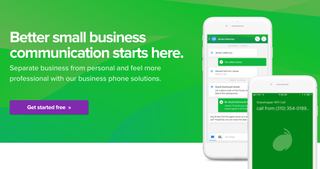
Bounce into your startup small business phone system and get started straight away – this is the ethos that defines Grasshopper Virtual Phone System and its multitude of features and excellent pricing.
Grasshopper isn’t going to punch at the same weight as Vonage and RingCentral but it isn’t trying to. This small business phone system is about giving an SMB the leg up it needs to compete with the enterprise with features that add polish to its performance. The platform allows for any business to scale up its customer care and contact capabilities using only a few mobile devices and some savvy extensions and virtual messages.
Grasshopper isn’t trying to compete with some of the more elaborate brands on the market, instead, they have made everything about the SMB and kept that focus intact across every part of the platform. This means that overall performance is strong and reliable with the option to use VoIP or Wi-Fi calls if the cellular signal is patchy or unavailable.
Using Grasshopper, you can get a professional voice actor to record your company welcome message, manage your conference calling, install business texting, and integrate the entire phone system across mobile devices and desktops. It is a primarily inbound system and employees will have to use their own devices for outbound calling but you can use the reporting to see who called whom to manage budgets, and you can customize how these calls appear to customers.
Read our full Grasshopper Virtual Phone System review.

6. Ooma Office: Best for the Startup and the SMB
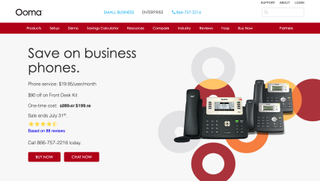
comes in at an excellent price point which makes it a great choice for the startup or the small business. You can dive straight into a small business phone system without having to dive into debt. Ooma also allows for you to choose different options on payment which means you can opt up or down in price dependent on the features you need.
However, Ooma asks that you invest in an IP phone to truly eke out the value from the system so there are extra costs involved if you want to go this route. You can run Ooma exclusively from your mobile or softphone, but the IP phone does add value.
You can programme Ooma to manage a number of system functions that will make a small office look big and a big office feel efficient. You can park and transfer calls, automatically reroute calls, and you can program the virtual receptionist to deftly flick callers out to the right departments. The latter also comes with the ability to customise your name dialling so if a customer calls in they can simply say the name of the person they want to speak to and the system will route them appropriately.
Ooma has great features included in its various packages, allowing you to customize the platform for your business. It offers Unified Communications-as-a-Service (UCaaS), hosted PBX, business voice services, and conferencing tools. Overall, once you’ve figured out which solution is the right one for you, Ooma is a straightforward solution for the small business and startup.

Looking for more advice on small business phone solutions? Take a look at our guide to the best international call services, or 10 ways to make an online call.

